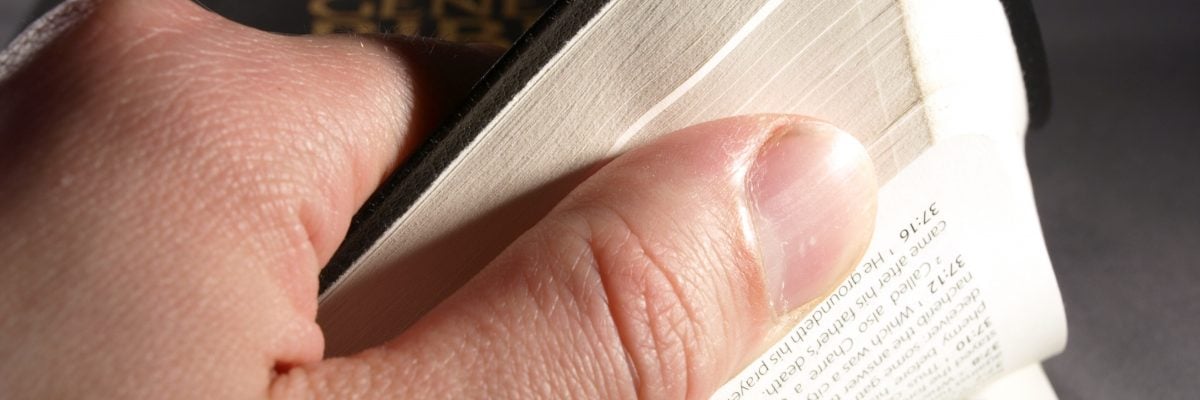
Perhaps no area in Catholic-Protestant apologetics involves as many outright falsehoods as the history of the Bible. To be sure, there are lots of theological topics on which Catholics and Protestants disagree, but for sheer number of popular Protestant arguments that are explicitly and undeniably false, nothing tops the question of where the Bible comes from and how many books it has.
Of course, there are plenty of historical debates both in and out of Christian circles. For example, there’s the annual fight over whether Christopher Columbus was a great or terrible man. That’s an issue upon which reasonable people, looking at the same evidence, may disagree. But imagine if one side of that debate claimed that there was no evidence Christopher Columbus even crossed the Atlantic. That’s the level of argument to be found in the surreal world of many Protestant versions of the history of the Bible: that of outlandish claims and easily disproven falsehoods.
For example, you may be familiar with the young-earth creationist Ken Ham and his website Answers in Genesis. The site sells a DVD called Why 66? The Canon of Scripture, presented by “the acclaimed British theologian and Bible teacher Brian Edwards,” identified as “one of Ken Ham’s favorite apologists.” Edwards spends nearly an hour trying to defend the idea that the sixty-six-book Protestant canon is the correct one, and his presentation is riddled with egregious factual errors. Perhaps the most galling of these is his claim that “it’s true that some of the early Church leaders beyond the New Testament quoted from the Apocrypha, though compared to their use of the Old Testament very rarely, but there’s no evidence that they treated them as Scripture” (Edwards asserts this at the 16:26 mark in the video).
No evidence that they treated the “Apocrypha” (more accurately, the deuterocanon) as Scripture? Rubbish. In book II, chapter 8 of On Christian Doctrine (c. A.D. 397), St. Augustine listed “the whole canon of Scripture on which we say this judgment is to be exercised,” and his list was exactly the Catholic (seventy-three-book) canon. After listing the entire Catholic canon (including the deuterocanonical books) he explains that these books are the full expression of “the authority of the Old Testament.”
Or consider what the entire Church taught at the First Council of Ephesus in 431, which quoted Sirach 32:19 and referred to the book as “divinely inspired Scripture.” And evidence points to even earlier recognition of the deuterocanon as Scripture. In a letter to Africanus, Origen (c. 184-253) refers to the story of “Susanna in the book of Daniel, which is used in the churches”—this is a story not found in the shorter Protestant version of Daniel—and later that “the churches use Tobias” (the book of Tobit, which Protestants reject).
Africanus had argued that Christians should use only those Old Testament books considered canonical by the Jews—an argument also commonly used by Protestant apologists. To this, Origen responded,
Are we to suppose that that Providence which in the sacred scriptures has ministered to the edification of all the churches of Christ, had no thought for those bought with a price, for whom Christ died; whom, although his Son, God who is love spared not, but gave him up for us all, that with him he might freely give us all things?
Significantly, he then quoted Prov. 22:28, “You shall not remove the ancient landmarks which your fathers have set,” suggesting that a distinct Christian Old Testament was old news by the early 200s.
Bizarrely, Edwards himself even admits that the earliest biblical canon known to man, the Muratorian Fragment dating to c. A.D. 170, says that “the book of Wisdom, written by the friends of Solomon in his honor” is canonical. Edwards concedes this, but only “because otherwise somebody who knows so much about it will come up and remind me afterwards I didn’t tell you,” and he asserts that it must have been a “coffee break slip by the copyist,” as if some careless scribe’s pen slipped and added several words by mistake.
Believe it or not, we can actually go back well before the Muratorian Fragment. The “Epistle of Barnabas,” dating c. A.D 70-130, quotes Wisdom 2:12 as the words of “the prophet,” and the letter of Pope Clement I quotes Judith back in A.D. 97, during the lifetime of the apostle John. You needn’t take my (or Edwards’) word for it: you can read these texts for yourself, and decide if Edwards is telling the truth when he says that there’s no evidence that the early Church Fathers treated these books as Scripture.
But Edwards is hardly alone in making these outrageously false assertions. Megachurch pastor Mark Driscoll (named “one of the twenty-five most influential pastors of the past twenty-five years”) has claimed that although “these books were read by some of God’s people, they were treated like popular Christian books in our own day, such as those by C.S. Lewis; they were never accepted as Scripture, for many reasons.” And even Bible.org, the world’s twelfth most popular Christian website, claims in its study on “How We Got the Bible” that “the collection of sixty-six books were [sic] properly recognized by the early church as the complete authoritative scriptures not to be added to or subtracted from.”
How does the site defend such a blatantly false claim? By claiming that “the Council of Jamnia (A.D. 90) officially recognized our thirty-nine Old Testament books” and that “the Council of Athenasius (A.D. 367) and the Council of Carthage (A.D. 397) recognized the twenty-seven books in our New Testament today as inspired.”
Now, the Council of Jamnia never existed, and the Third Council of Carthage in 397 endorsed the Catholic canon of Scripture, not the Protestant canon (you can read it yourself). As for the Council of Athenasius [sic] in A.D. 367? There’s no such council. This seems to be an extremely confused reference to a letter written by St. Athanasius in 367, in which he lists the books he considers canonical… a list explicitly including Baruch (which Protestants claim is non-canonical).
So you’ll note that none of Bible.org’s evidence turned out to say what it claimed. Not one of these sources (much less “the early church” as a whole) claimed that “the collection of 66 books” of the Protestant Bible were “the complete authoritative scriptures not to be added to or subtracted from.”
It’s hard to know if these Protestant apologists and others who make similar arguments are trying to fudge the facts or are just ignorant, but in any case they aren’t cases of a pastor saying something incorrect off the cuff. We’re talking about books, pre-prepared talks, and Bible study series containing statements so obviously false that it would take mere seconds of research to debunk. To give them the benefit of the doubt, years ago I personally e-mailed both Mark Driscoll and Brian Edwards (the latter of whom promised to “be in touch later”—this was in 2012), only to find them still regurgitating their earlier claims, without any correction, years later.
At this point, such errors no longer appear to be innocent mistakes or something that can be chalked up to “coffee break slips by the copyist.” Obvious questions follow. Why would they resort to falsehoods if there was a good case to be made for a sixty-six-book Bible? And without those falsehoods, is there any reason to believe that Protestants have the right canon of Scripture?



